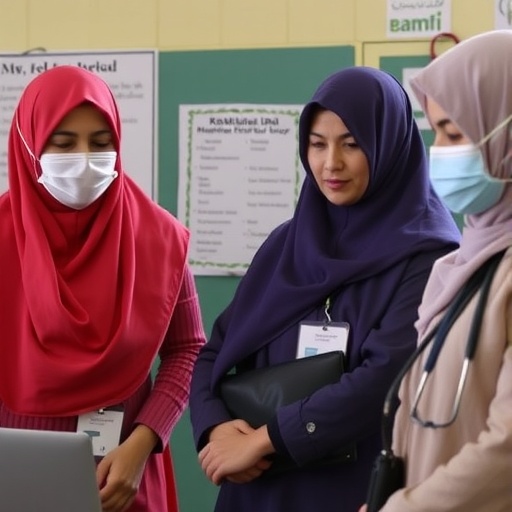In a groundbreaking study conducted in Iran, researchers Ghasemi and Shakerian explored the intricate relationship between incentives and the motivation of community health workers. This research provides robust insights into how targeted incentives can significantly enhance job performance within the healthcare framework, illustrating the critical role that motivation plays in the effectiveness of health services delivery, particularly in community settings.
The research addresses an often-overlooked aspect of healthcare systems: the human element. Community health workers are essential in bridging the gap between healthcare providers and the communities they serve. However, their motivation levels are frequently subject to fluctuations due to varying external and internal factors. The study provides a comprehensive analysis of how different types of incentives—both financial and non-financial—can lead to substantial improvements in performance among these frontline workers.
In the context of community health, motivation extends beyond mere job satisfaction. It includes the desire to actively engage in community welfare activities, provide high-quality healthcare services, and fulfill the critical responsibilities assigned to health workers. Ghasemi and Shakerian’s research delves deep into how different motivational drivers can lead to enhanced health outcomes for communities, emphasizing the importance of understanding what truly motivates these workers.
The study further identifies the specific types of incentives that have the most considerable impact on community health workers’ motivation. Financial incentives, such as bonuses for exceptional performance or salary increments, are acknowledged as primary motivators. However, the findings suggest that these are not the sole drivers. Non-monetary incentives, including recognition programs, opportunities for professional development, and a supportive work environment, also play a pivotal role in sustaining motivation levels.
One surprising revelation from this research is that while financial incentives may offer immediate gratification, sustainable motivation often stems from non-financial rewards. Community health workers often value the acknowledgement of their efforts as much as monetary rewards. This highlights the need for healthcare administrators to adopt a more holistic approach to employee motivation that encompasses both financial and non-financial incentives.
The implications of the research extend beyond the community health sector in Iran. Many global health systems can benefit from these findings. As healthcare initiatives face mounting pressure to improve quality and accessibility, understanding how to motivate health workers can lead to better health service outcomes globally. The study serves as a critical reminder that healthcare systems are only as good as the people who operate within them.
Moreover, the research opens up a dialogue regarding the long-term sustainability of community health workforces. Without adequate motivational structures, these vital health workers risk burnout and high turnover, which ultimately compromise the quality of care patients receive. The results indicate that interventions designed to boost morale and job satisfaction could lead not only to improved performance but also to increased retention rates among community health workers.
Equally important, the study underscores the need for targeted incentive programs tailored to the unique challenges faced by community health workers in various regions. Cultural nuances, socioeconomic conditions, and community-specific health issues must be taken into account when designing these incentive systems. A one-size-fits-all approach may yield limited results; instead, localized strategies should be developed to address the specific needs and motivators of community health workers effectively.
As policymakers look to reinforce community health initiatives, Ghasemi and Shakerian’s findings could inform future legislation and funding decisions. By recognizing the pivotal role of motivation in health outcomes, governments and health organizations can allocate resources more effectively, ensuring that community health workers are not only adequately compensated but are also recognized as integral parts of the healthcare system.
The role of community health workers cannot be overstated. They often serve as the first point of contact within the healthcare system for many individuals, particularly in rural or underserved areas. Therefore, ensuring they are motivated and adequately incentivized is crucial in the fight against health disparities. This research provides clear evidence that doing so will not only enhance their job performance but ultimately lead to better health outcomes for the communities they serve.
Additionally, the study prompts healthcare systems worldwide to reconsider how they promote and support their health workers. For instance, with the rapid advancements in technology, incorporating digital recognition platforms to celebrate community health workers’ achievements could further boost morale. Engaging health workers in decision-making processes might also empower them and create a stronger sense of belonging within healthcare institutions.
In conclusion, the research conducted by Ghasemi and Shakerian presents a compelling case for the strategic implementation of incentive programs aimed at improving motivation and job performance among community health workers. The findings suggest that by focusing on both financial and non-financial incentives, healthcare administrators can cultivate an energized workforce that is dedicated to improving the health outcomes of their communities.
The implications of this research are profound, offering a pathway not only for enhancing community health performance but also for shaping a more equitable and effective healthcare system globally. As the world continues to navigate the complexities of health service delivery, the insights garnered from this study may prove essential in fostering resilient healthcare systems capable of meeting the demands of diverse populations.
Subject of Research: Incentives on motivation and job performance of community health workers.
Article Title: Incentives on the motivation and job performance; insights from community health workers in Iran.
Article References:
Ghasemi, M., Shakerian, S. Incentives on the motivation and job performance; insights from community health workers in Iran.
BMC Health Serv Res 25, 1429 (2025). https://doi.org/10.1186/s12913-025-13543-6
Image Credits: AI Generated
DOI: 10.1186/s12913-025-13543-6
Keywords: Community health workers, motivation, job performance, incentives, healthcare systems, Iran.
Tags: community health workers motivationcommunity welfare engagementenhancing job performance in health workersfinancial and non-financial incentivesfrontline healthcare workers performancehealthcare delivery effectivenesshuman element in healthcare systemsincentives in healthcare performanceIran community health studymotivation and health outcomesmotivation factors in healthcareunderstanding community health worker needs





